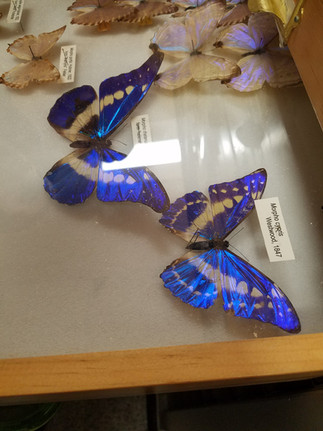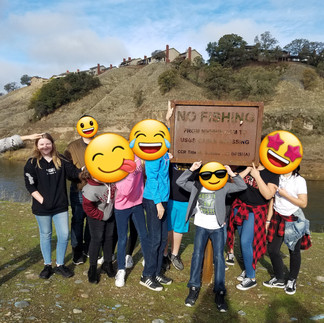15 Great Science Field Trips for Middle and High School
- Christi Moore
- Nov 12, 2024
- 6 min read
Field trips are one of the best ways for students to make those real-world connections we are always trying to emphasize in class and guess what? Field trips are not just for elementary students! After many years of teaching science I have decided to compile my favorite 15 great science field trips especially geared toward middle and high school students.

Greenhouses
Many local colleges, universities, or preserves have greenhouses open to the public or available upon request for a tour. I've taken my Biology and Life Science students on a tour of college and university greenhouses and let me tell you, they are amazing! There are often several different greenhouses, each with it's own regulated climate to suit a variety of plants. Topics you could explore might include plant adaptations, plant reproduction, pollinators and other relationships within an ecosystem, biomes etc. Check around for a local greenhouse; there's a good chance you can find one not too far from you!
Cavern Exploration
One of my all time favorite field trips was to some local caverns. We did drive a little further to get to them, but it was worth it. My students learned so much about rocks, minerals, and the chemical processes involved with cave formation. It was an unforgettable experience for us. You could tie this field trip into earth science, chemistry, and life science depending on what you want to focus on.
Local Electric Company
Our local electric company is awesome! They enjoy working with the public to educate about everything from safety, to the flow of electricity, and how their employees fix electrical problems. This is a great STEM related field trip. Check with your local electric company to see if they offer a tour. Many times they have working models and professionals that are happy to cater an experience to the group of students passing through.
Local Discovery Science Centers
Most larger cities have science discovery centers or museums and these are usually an easy option if you don't have the time to plan many of the details yourself. One such discovery center I have taken my students to involved a boat ride where students collected and sorted marine samples with a trawl net, took data with a marine biologist, and then completed a dissection of the invasive lionfish. Many of my students said this was the best field trip of the year!
Botanical Gardens
One of my personal favorite places to explore, whether with my students or my own family, is a botanical garden. There are a variety of topics you could focus on such as ecosystems, native plant and animal life, plant reproduction, bioengineering, and nature conservation. But even if you don't teach a life science you could still consider topics such as water conservation and irrigation or the use of organic pesticides or fertilizers. Sometimes I like surprising my students with a field trip that does not seem connected to their subject area at first (ie. Chemistry) and then helping them discover how the different branches of science actually DO relate to each other!
Entomology Museum
This may not be your first thought as a field trip, but when I stumbled across the Entomology Museum at UC Davis, I was thrilled. They have the largest collection of insects in the country! My students were fascinated to meet scientists in this field and learn about some of the current research projects that were happening...and the bugs were pretty cool, too!
Local Factory Tour
A tour of a local factory can be a really fun way for your chemistry or physical science students to make a real world connection to what they are learning in class. Even chocolate or candy factories can be useful for discussing topics like melting points, solutions, and organic chemistry. Of course, it's not hard to make connections to engineering principles and robotics in a factory either. Many factories will even tailor the tour to the content you want covered, so call ahead and see if you can have an expert lead your students.
Nature Preserve
Nature preserves offer a great place to learn about ecosystems and the environment, but there are also a variety of chemistry topics you can cover, too. For example, at one of our local nature preserves, the educational team has a program that allows students to test water samples for pH levels and pollutants. Then the students learn about microbiology and the affect certain pollutants may have on microorganisms and ultimately larger plant and animal life. It is such a fabulous way for students to make the connection between chemistry and biology. If your nearest nature preserve does not have an educational team, don't sweat! You can easily bring your own water testing kits and have students perform a simple field test of their own. It may require a little more prep on your part, but the hands-on experience is worth it!
Water Treatment Plant
Speaking of water testing...another field trip idea for your chemistry students is a water treatment plant. Many of our students have no idea how clean water makes it to their kitchen sink and this is a fantastic way for students to learn about the chemistry and engineering involved with getting clean water to homes and businesses.

Local Farms
Going to a farm might seem like an elementary class field trip, but it doesn't have to be! We have visited a dairy farm where students were able to view the process of milk pasteurization and producing cheese. Other tours can educate on fertilizer and pesticide use or machines used on the farm. This might be a great option for students involved in agricultural studies, bioengineering, or industrial engineering!
Animal Rescue Centers
Since I live close to the Gulf of Mexico, we have several animal rescue centers, including a manatee sanctuary and viewing area where a nearby electric plant releases heat into an inlet of water for manatees to congregate during the colder winter months. Some of these animal rescue centers offer self-guided tours while others require a volunteer or educator to lead the group. There are some obvious connections to biology and life science (such as ecosystems, conservation, interactions between living things etc), but you may also be able to tie in a physical science, such as the engineering involved with warming ocean waters for the manatees (as mentioned above) from the nearby factory.
Local Fish Hatchery
If you live near an estuary or river system, you may have a fish hatchery around you. When I toured our local fish hatchery with my middle school students they were amazed to learn about the journey salmon make from the ocean back to the river bed where they hatched to spawn. We learned about engineering challenges when creating hatcheries and actually watched workers fertilize salmon eggs and care for the hatchlings. This is another field trip that could tie in to both physical and life science topics.
STEM College Competitions
Do you live near a college or university? Check to see if they have a STEM day! Many local colleges and universities have STEM exhibits and competitions that are open to the public and in some cases, they even allow middle and high school students to compete. Over the past several years, our eighth grade physical science students have competed (and won) in a local bridge building competition. If you teach an engineering of physics class, this could be a great option for your students to get out of the classroom and see some real-world science in action!

Aquarium
I love field trips to local aquariums. Students can view a variety of marine life and learn so many things at aquariums. One of our local aquariums also offers a squid dissection along with the tour, so students could practice dissection skills and I don't have to deal with the clean-up! Scavenger hunts are also a fun way to keep students engaged while they are checking out the different animals.
Nuclear Facility or University with Research Reactor
Depending on where you live, there may be a nuclear facility or university with a research reactor available for viewing. This can be a very educational and enlightening experience for your chemistry and physics students, but there are often a few more planning steps involved. Some facilities allow tours, but need quite a bit of advance notice so they can schedule a tour guide. Safety protocols are taken very seriously and not everyone is allowed to view, however, some universities offer tours of research reactors and this can be equally interesting!





























































